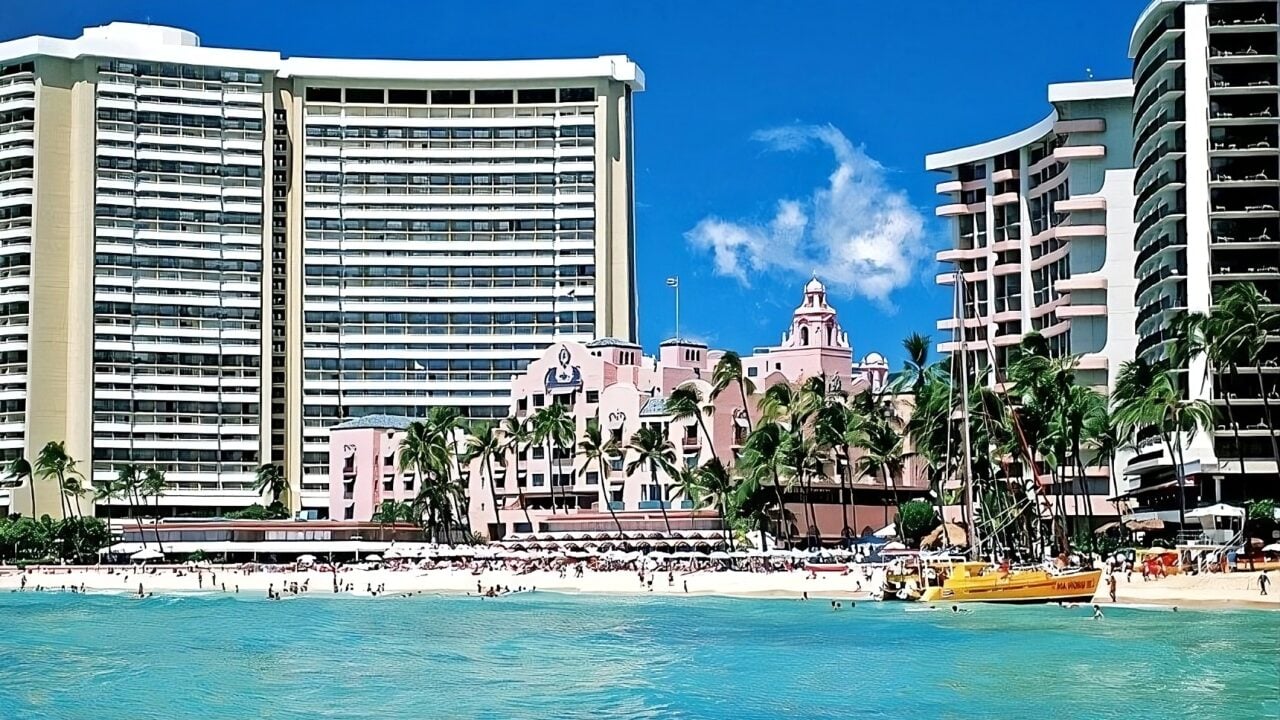Nearly $1 billion worth of Hawaii’s most valuable tourist properties have just changed hands this year, with the Royal Hawaiian land at $510 million, Four Seasons Hualalai at about $400 million, and additional major transactions including the transfer of the Hyatt Regency Waikiki leasehold in a nine-figure deal.
The pattern matters because these crown jewels directly shape future visitor costs, ground lease pricing, and who ultimately controls Hawaii’s most iconic hotels.
The billion-dollar pattern that reshaped Hawaii travel in 2025.
The Royal Hawaiian sale closed November 6 for $510 million, transferring 10.3 acres of prime Waikiki beachfront from Kamehameha Schools to Daisho, a Japan-based investment company with a $1.5 billion global portfolio spanning Japan, Singapore, and Australia, according to company materials. This fee simple land purchase marks Daisho’s first major hospitality entry into Hawaii and reflects growing long-term interest in Pacific assets.
Earlier this year, Kamehameha Schools sold nearly 500 acres under Four Seasons Hualalai on the Big Island to billionaire Michael Dell for approximately $400 million, according to state land records. With those two transactions, $910 million in former Hawaiian trust land shifted from institutional Hawaiian stewardship to foreign and mainland ownership.
A third huge transaction continued the trend. In September, the long-term leasehold under Hyatt Regency Waikiki transferred to new investors in a nine-figure transaction, according to industry sources. While the exact price was not disclosed publicly, its scale places it among the largest Hawaii hospitality-related transfers of the year and reinforces the broader movement of critical Hawaii travel properties into new hands.
The nearly $1B pressure behind Kamehameha Schools land sales.
Kamehameha Schools describes the Royal Hawaiian and Hualalai sales as strategic moves that align with its educational mission. The financial conditions of the past two years add more context. The trust faces a $872.5 million settlement tied to Lahaina wildfire litigation, part of a wider $4 billion liability environment. It also recorded an $819 million deficit in 2024, the largest in its storied history.
Despite its $15.2 billion endowment and long-standing reliance on ground leases for income, Kamehameha Schools’ 2025 actions reflect a shift toward liquidating properties in core Hawaii visitor districts. Public records show more than $910 million in trust-held Hawaii real estate sold this year. At the same time, they continue acquiring land elsewhere in the state, including about 11,000 acres purchased over the past several years. This rebalancing comes during a period of unprecedented financial pressure.
Legal challenges to their Hawaiian-preference admissions policy have also required significant resources over the past decade. Taken together, these demands have created an environment where selling high-value tourism land has become a practical and immediate way to stabilize the trust’s financial position.
Lease renewals spike up to 1,000%: what that means for Hawaii room rates.
Understanding the impact of these sales requires understanding Hawaii’s system of ground leases. Many hotels in Waikiki operate on long-term leases rather than owning the land on which they are built. When these leases renew, rents reset to the current fair market land value. The changes can be dramatic.
At Sans Souci, near Kapiolani Park, renewals have driven some residential lease rents for modest condominium units to between $3,000 and $5,000 per month. In a widely cited arbitration case documented in the American Bar Association journal, a Hawaii hotel’s land lease increased from $187,000 per year to $3.5 million per year after renewal. That is a 1,871% increase before the operator spends anything on payroll, maintenance, utilities, insurance, or taxes.
The Royal Hawaiian land lease expires in 2076, which seems far in the future. Yet multiple major Waikiki hotels face renewals that begin in the early 2030s, effectively tomorrow in Hawaii hotel planning, according to public land records. These scheduled resets are one of the lesser known mechanisms that will drive future room rates.
When landowners shift from Hawaiian trusts, which have historically balanced commercial yield with community-centered stewardship, to global investors focused exclusively on long-term financial performance, the dynamics will change dramatically.
Visitors will feel these differences in long-term higher nightly rates. Hotels will encounter more aggressive lease structures. Hawaii’s tourism economy will increasingly operate within new cost frameworks shaped by investors whose priorities originate outside of Hawaii.
Who owns Waikiki now.
Waikiki’s hotel land ownership base has shifted more in 2025 than in many previous decades combined. Kamehameha Schools had the Royal Hawaiian land since 1884. The land beneath the Hyatt Regency Waikiki was held through legacy Hawaii ownership structures for more than a century before being transferred to new investors in 2025. Today, Queen Emma Land Company is the last major Native Hawaiian serving institution with fee interest in Waikiki beachfront land, including parcels beneath Outrigger Waikiki and parts of the International Market Place.
Kamehameha Schools still owns the land beneath the Royal Hawaiian Center, including the Helumoa coconut grove, a site with deep cultural significance. The trust has stated that this parcel is not for sale. Yet Kamehameha Schools now holds only a single major property in Waikiki, a dramatic change from its historical role as one of the area’s primary land stewards.
Liliuokalani Trust previously held several Waikiki hotel lands, sold Alohilani for $195 million, and Hilton Waikiki Beach for $78 million. It retains fee interest beneath certain Marriott properties and has said those are not for sale. Nevertheless, the trend is impossible to ignore. Hawaiian trusts now hold far less Waikiki hotel land than at any point in modern history, and combined foreign and mainland investors now play a very major role.
Daisho’s entry into Hawaii’s hospitality industry comes even as Japanese visitor arrivals have declined. That makes this ownership a long-term investment strategy rather than a Japanese tourism-related play. For Hawaii, this shift means some of the most symbolically important tourism properties are now held by owners whose sole focus in the islands is financial.
What’s clear is that the identity of the landowner affects how future lease negotiations will balance commercial returns against cultural or community considerations. That balance is shifting in a new and profound way.
What Hawaii hotels will be next?
Multiple major Waikiki hotels have ground lease events scheduled to begin in the early 2030s. None of these properties are currently for sale, and each has distinct ownership and financing arrangements. Even so, the timing alone is likely to attract investors with long-term strategies who already watched what happened this year closely.
Major investors from outside Hawaii continue to target island hospitality assets in key visitor destinations. Hawaii’s nearly $1 billion in 2025 transactions alone signal a strong and growing appetite for the islands’ crown jewel tourism land. With beachfront properties becoming increasingly scarce, the pressure on remaining legacy-owned land is likely to intensify rapidly in the coming years.
How do you see these huge changes impacting Hawaii travel?
Get Breaking Hawaii Travel News







The Royal Hawaiian Hotel has been allowed to deteriorate for many years. It used to be our favorite but has become shabby inside……worn carpets, torn shades in the rooms. Last season we moved to the Four Seasons on Maui, which was not as nice as the Royal Hawaiian in its heyday.
Sounds like prices will eliminate the average vacationer. The worldly trend to greed.
It broke my heart when I learned about this sale. There are other ways of making money instead of selling valuable Hawaiiian-owned land which have been in the hands of a Hawaiian institution since the days of the monarchy. Shame on you Kamehameha. You will regret your decisions to sell these precious parcels for eternity.
This is Not what was meant to happen to protect these lands- These belong to the Hawaiian People Not outsiders!! Shame on Kamehameha schools for Not keeping these lands in Hawaiian ownership- education is Not more important than culture!
So much for “Hawaiian lands in Hawaiian hands.” And I am sure the complaining will continue about tourism as foreign companies develop more high rise hotels.